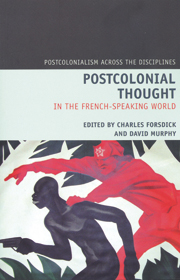Book contents
- Frontmatter
- Contents
- Acknowledgements
- Introduction: Situating Francophone Postcolonial Thought
- Section 1 Twelve Key Thinkers
- 1 Aimé Césaire and Francophone Postcolonial Thought
- 2 Maryse Condé: Post-Postcolonial?
- 3 Jacques Derrida: Colonialism, Philosophy and Autobiography
- 4 Assia Djebar: ‘Fiction as a way of “thinking”’
- 5 Frantz Fanon: Colonialism and Violence
- 6 Édouard Glissant: Dealing in Globality
- 7 Tangled History and Photographic (In)Visibility: Ho Chi Minh on the Edge of French Political Culture
- 8 Translating Plurality: Abdelkébir Khatibi and Postcolonial Writing in French from the Maghreb
- 9 Albert Memmi: The Conflict of Legacies
- 10 V. Y. Mudimbe's ‘Long Nineteenth Century’
- 11 Roads to Freedom: Jean-Paul Sartre and Anti-colonialism
- 12 Léopold Sédar Senghor: Race, Language, Empire
- Section 2 Themes, Approaches, Theories
- Notes on Contributors
- Bibliography
- Index
1 - Aimé Césaire and Francophone Postcolonial Thought
from Section 1 - Twelve Key Thinkers
- Frontmatter
- Contents
- Acknowledgements
- Introduction: Situating Francophone Postcolonial Thought
- Section 1 Twelve Key Thinkers
- 1 Aimé Césaire and Francophone Postcolonial Thought
- 2 Maryse Condé: Post-Postcolonial?
- 3 Jacques Derrida: Colonialism, Philosophy and Autobiography
- 4 Assia Djebar: ‘Fiction as a way of “thinking”’
- 5 Frantz Fanon: Colonialism and Violence
- 6 Édouard Glissant: Dealing in Globality
- 7 Tangled History and Photographic (In)Visibility: Ho Chi Minh on the Edge of French Political Culture
- 8 Translating Plurality: Abdelkébir Khatibi and Postcolonial Writing in French from the Maghreb
- 9 Albert Memmi: The Conflict of Legacies
- 10 V. Y. Mudimbe's ‘Long Nineteenth Century’
- 11 Roads to Freedom: Jean-Paul Sartre and Anti-colonialism
- 12 Léopold Sédar Senghor: Race, Language, Empire
- Section 2 Themes, Approaches, Theories
- Notes on Contributors
- Bibliography
- Index
Summary
Aimé Césaire was born in 1913 in Basse-Pointe in Martinique and, like so many members of the educated elite of the colonies, in his late teens he was was drawn to Europe, where he studied at the Lycée Louis-le-Grand in Paris from 1932, and later, from 1935, at the even more prestigious École Normale Supérieure (ENS). It was during these years in Paris that his reputation was sealed as co-founder, along with the Senegalese poet-politician Léopold Sédar Senghor (see Chapter 12) and the Guyanese poet, Léon Gontran Damas, of the négritude movement, which could be said to have been launched by this small catalyst group of expatriate writers (see Chapter 18). For in 1935, Césaire, Damas and Senghor founded the review L'Étudiant noir, and it was in this journal that Césaire first used the term négritude. Suzanne Roussy, also from Martinique, who would marry Césaire in 1937, contributed to this review as well. It was towards 1938 that Aimé Césaire finished writing his epic poem entitled Cahier d'un retour au pays natal (begun during a brief holiday in former Yugoslavia in 1935) and completed his studies at the ENS, studies crowned by a thesis on the theme of the South in the ‘littérature négro-américaine’ of the United States. The review Volontés published the Cahier in 1939, and Césaire returned in the same year to Martinique, where he and his wife became schoolteachers at the Lycée Victor Schoelcher in Fort-de-France (Césaire's pupils there would include Édouard Glissant and Frantz Fanon).
- Type
- Chapter
- Information
- Postcolonial Thought in the French Speaking World , pp. 31 - 41Publisher: Liverpool University PressPrint publication year: 2009
- 1
- Cited by

